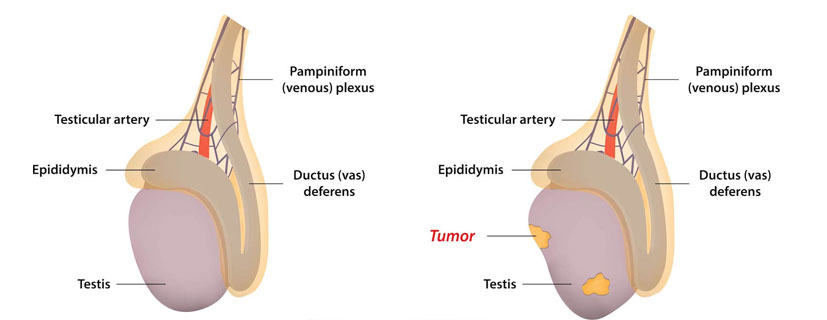Book Appoinment
Testicular Cancer


Testicular cancer is a type of cancer that develops in the testicles, which are the male reproductive organs responsible for producing sperm and testosterone. Testicular cancer is relatively rare but is the most common cancer in young men aged 15 to 35. It is highly treatable, especially when detected early.
Causes:
The exact cause of testicular cancer is not well understood. However, several risk factors have been identified:
- Undescended testicle (cryptorchidism): Men who had one or both testicles that did not descend into the scrotum at birth (cryptorchidism) have a higher risk of testicular cancer.
- Family history: Having a close relative, such as a father or brother, with testicular cancer increases the risk.
- Abnormal testicular development: Certain conditions affecting testicular development, such as Klinefelter syndrome, may increase the risk of testicular cancer.
- Age: Testicular cancer is more common in young and middle-aged men, with the highest incidence occurring between the ages of 20 and 34.
- Race and ethnicity: Testicular cancer is more common in Caucasian men compared to men of other ethnic backgrounds.
Symptoms:
Common symptoms of testicular cancer include:
- A painless lump or swelling in the testicle: The most common sign of testicular cancer is a painless lump or swelling in one or both testicles.
- Heaviness or discomfort in the scrotum: Some men may experience a feeling of heaviness or a dull ache in the scrotum or lower abdomen.
- Changes in the size or shape of the testicles: Testicular cancer can cause the testicle to become larger or smaller or cause it to change shape.
- Pain or discomfort in the testicle or scrotum: In some cases, testicular cancer may cause pain or discomfort in the affected testicle or scrotum.
Diagnosis and Treatment:
If testicular cancer is suspected, the following diagnostic procedures may be performed:
- Physical examination: The healthcare provider will examine the testicles and scrotum to check for abnormalities.
- Ultrasound: An ultrasound scan uses sound waves to create images of the testicles, helping to determine if a lump is likely cancerous.
- Blood tests: Blood tests can measure certain markers, such as alpha-fetoprotein (AFP), beta-human chorionic gonadotropin (β-hCG), and lactate dehydrogenase (LDH), which can be elevated in testicular cancer.
- Testicular biopsy: In some cases, a biopsy may be performed to obtain a tissue sample for further analysis under a microscope. However, testicular biopsy is not commonly done because it carries a risk of spreading cancer cells.
